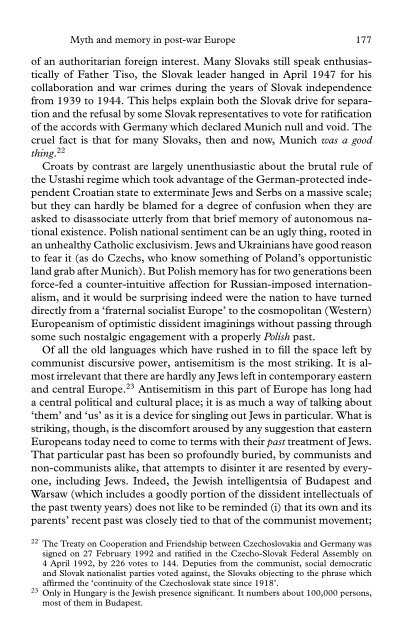Memory and Power in Post-War Europe: Studies in the Presence of ...
Memory and Power in Post-War Europe: Studies in the Presence of ...
Memory and Power in Post-War Europe: Studies in the Presence of ...
You also want an ePaper? Increase the reach of your titles
YUMPU automatically turns print PDFs into web optimized ePapers that Google loves.
Myth <strong>and</strong> memory <strong>in</strong> post-war <strong>Europe</strong> 177<br />
<strong>of</strong> an authoritarian foreign <strong>in</strong>terest. Many Slovaks still speak enthusiastically<br />
<strong>of</strong> Fa<strong>the</strong>r Tiso, <strong>the</strong> Slovak leader hanged <strong>in</strong> April 1947 for his<br />
collaboration <strong>and</strong> war crimes dur<strong>in</strong>g <strong>the</strong> years <strong>of</strong> Slovak <strong>in</strong>dependence<br />
from 1939 to 1944. This helps expla<strong>in</strong> both <strong>the</strong> Slovak drive for separation<br />
<strong>and</strong> <strong>the</strong> refusal by some Slovak representatives to vote for ratification<br />
<strong>of</strong> <strong>the</strong> accords with Germany which declared Munich null <strong>and</strong> void. The<br />
cruel fact is that for many Slovaks, <strong>the</strong>n <strong>and</strong> now, Munich was a good<br />
th<strong>in</strong>g. 22<br />
Croats by contrast are largely unenthusiastic about <strong>the</strong> brutal rule <strong>of</strong><br />
<strong>the</strong> Ustashi regime which took advantage <strong>of</strong> <strong>the</strong> German-protected <strong>in</strong>dependent<br />
Croatian state to exterm<strong>in</strong>ate Jews <strong>and</strong> Serbs on a massive scale;<br />
but <strong>the</strong>y can hardly be blamed for a degree <strong>of</strong> confusion when <strong>the</strong>y are<br />
asked to disassociate utterly from that brief memory <strong>of</strong> autonomous national<br />
existence. Polish national sentiment can be an ugly th<strong>in</strong>g, rooted <strong>in</strong><br />
an unhealthy Catholic exclusivism. Jews <strong>and</strong> Ukra<strong>in</strong>ians have good reason<br />
to fear it (as do Czechs, who know someth<strong>in</strong>g <strong>of</strong> Pol<strong>and</strong>’s opportunistic<br />
l<strong>and</strong> grab after Munich). But Polish memory has for two generations been<br />
force-fed a counter-<strong>in</strong>tuitive affection for Russian-imposed <strong>in</strong>ternationalism,<br />
<strong>and</strong> it would be surpris<strong>in</strong>g <strong>in</strong>deed were <strong>the</strong> nation to have turned<br />
directly from a ‘fraternal socialist <strong>Europe</strong>’ to <strong>the</strong> cosmopolitan (Western)<br />
<strong>Europe</strong>anism <strong>of</strong> optimistic dissident imag<strong>in</strong><strong>in</strong>gs without pass<strong>in</strong>g through<br />
some such nostalgic engagement with a properly Polish past.<br />
Of all <strong>the</strong> old languages which have rushed <strong>in</strong> to fill <strong>the</strong> space left by<br />
communist discursive power, antisemitism is <strong>the</strong> most strik<strong>in</strong>g. It is almost<br />
irrelevant that <strong>the</strong>re are hardly any Jews left <strong>in</strong> contemporary eastern<br />
<strong>and</strong> central <strong>Europe</strong>. 23 Antisemitism <strong>in</strong> this part <strong>of</strong> <strong>Europe</strong> has long had<br />
a central political <strong>and</strong> cultural place; it is as much a way <strong>of</strong> talk<strong>in</strong>g about<br />
‘<strong>the</strong>m’ <strong>and</strong> ‘us’ as it is a device for s<strong>in</strong>gl<strong>in</strong>g out Jews <strong>in</strong> particular. What is<br />
strik<strong>in</strong>g, though, is <strong>the</strong> discomfort aroused by any suggestion that eastern<br />
<strong>Europe</strong>ans today need to come to terms with <strong>the</strong>ir past treatment <strong>of</strong> Jews.<br />
That particular past has been so pr<strong>of</strong>oundly buried, by communists <strong>and</strong><br />
non-communists alike, that attempts to dis<strong>in</strong>ter it are resented by everyone,<br />
<strong>in</strong>clud<strong>in</strong>g Jews. Indeed, <strong>the</strong> Jewish <strong>in</strong>telligentsia <strong>of</strong> Budapest <strong>and</strong><br />
<strong>War</strong>saw (which <strong>in</strong>cludes a goodly portion <strong>of</strong> <strong>the</strong> dissident <strong>in</strong>tellectuals <strong>of</strong><br />
<strong>the</strong> past twenty years) does not like to be rem<strong>in</strong>ded (i) that its own <strong>and</strong> its<br />
parents’ recent past was closely tied to that <strong>of</strong> <strong>the</strong> communist movement;<br />
22 The Treaty on Cooperation <strong>and</strong> Friendship between Czechoslovakia <strong>and</strong> Germany was<br />
signed on 27 February 1992 <strong>and</strong> ratified <strong>in</strong> <strong>the</strong> Czecho-Slovak Federal Assembly on<br />
4 April 1992, by 226 votes to 144. Deputies from <strong>the</strong> communist, social democratic<br />
<strong>and</strong> Slovak nationalist parties voted aga<strong>in</strong>st, <strong>the</strong> Slovaks object<strong>in</strong>g to <strong>the</strong> phrase which<br />
affirmed <strong>the</strong> ‘cont<strong>in</strong>uity <strong>of</strong> <strong>the</strong> Czechoslovak state s<strong>in</strong>ce 1918’.<br />
23 Only <strong>in</strong> Hungary is <strong>the</strong> Jewish presence significant. It numbers about 100,000 persons,<br />
most <strong>of</strong> <strong>the</strong>m <strong>in</strong> Budapest.
















